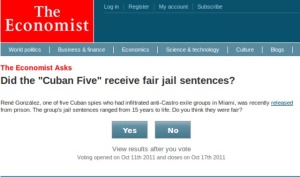Iroel Sánchez
Las encuestas pueden dar sorpresas. Sobre todo cuando las realizan poderosos medios de comunicación y los resultados son totalmente opuestos a los que la marea mediática ha tratado de inculcar sistemáticamente en sus audiencias.
Así sucedió en noviembre de 2009 cuando el suplemento literario Babelia, del diario español El País, consultó a 109 personalidades -seleccionadas cuidadosamente- sobre quiénes son los diez personajes que han marcado la historia contemporánea de América Latina. La respuesta fue una bomba de la que se ha hablado muy poco: los cuatro primeros nombres de la lista resultante fueron, en este orden, Simón Bolívar, Fidel Castro, Ernesto Che Guevara y José Martí.
Lo mismo ocurrió en julio de 2005 cuando la emisora de radio BBC preguntó por el filósofo más importante de todos los tiempos y se encontró con que el tantas veces maldecido Carlos Marx ganaba el primer lugar con amplia ventaja.
Ambos casos enviaban señales muy claras de que hay verdades que permanecen en la conciencia social más allá del sistemático y masivo adoctrinamiento que ejerce la clase dominante a través de los medios de comunicación y las estructuras, educativas, laborales, y de consumo.
Recuerdo esto, al ver cómo la influyente publicación británica The Economist ha colocado este 11 de octubre en su sitio en Internet una encuesta preguntando si los cinco antiterroristas cubanos condenados en Estados Unidos recibieron penas de cárcel justas, a la vez que enlaza a un artículo que, aunque dice algunas verdades, no deja de repetir los clichés de la retórica anticastrista en este caso, sin hacer ninguna referencia a los actos terroristas ejecutados desde el Sur de la Florida contra Cuba, razón por la cual estas personas se encontraban en Miami. Para The Economist, “Los Cinco” “habían estado espiando a grupos de exiliados en Miami que se oponían al gobierno de Fidel Castro” pero que los “opositores” pagaran por poner bombas en hoteles La Habana no tiene mucha relevancia.
“René González, uno de los cinco espías cubanos infiltrados en grupos anticastristas exiliados en Miami, fue recientemente liberado de prisión. Las condenas al grupo oscilaron de 15 años a cadena perpetua. ¿Piensa usted que fueron justas?”, interroga The Economist, incapaz de poner la palabra donde va y sustituir el eufemismo de “anticastristas” por el exacto adjetivo de terroristas.
Pero, no obstante, casi el 80% de los votantes en la primera jornada había votado “No” y calificado de injustas las condenas a los cubanos. La verdad sobre los hombres considerados héroes por la Revolución que ha sido maldecida por defender las ideas de Bolívar, Fidel, el Che, Martí y Marx, quizá pueda abrirse paso hacia los lectores de The Economist. Ya yo le di mi voto, e invito a todos los que lean este artículo a hacerlo. (Publicado en CubAhora)
